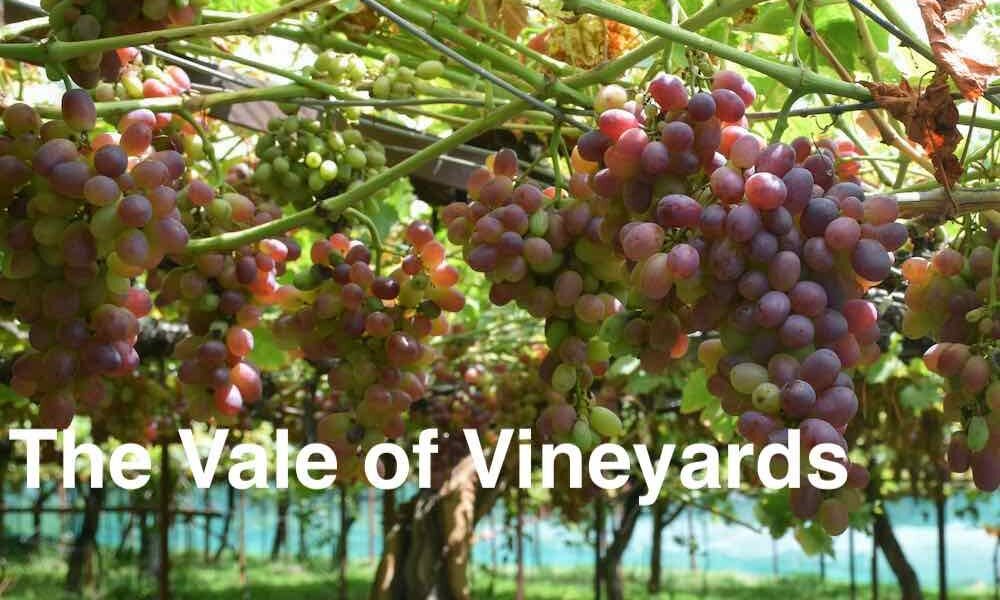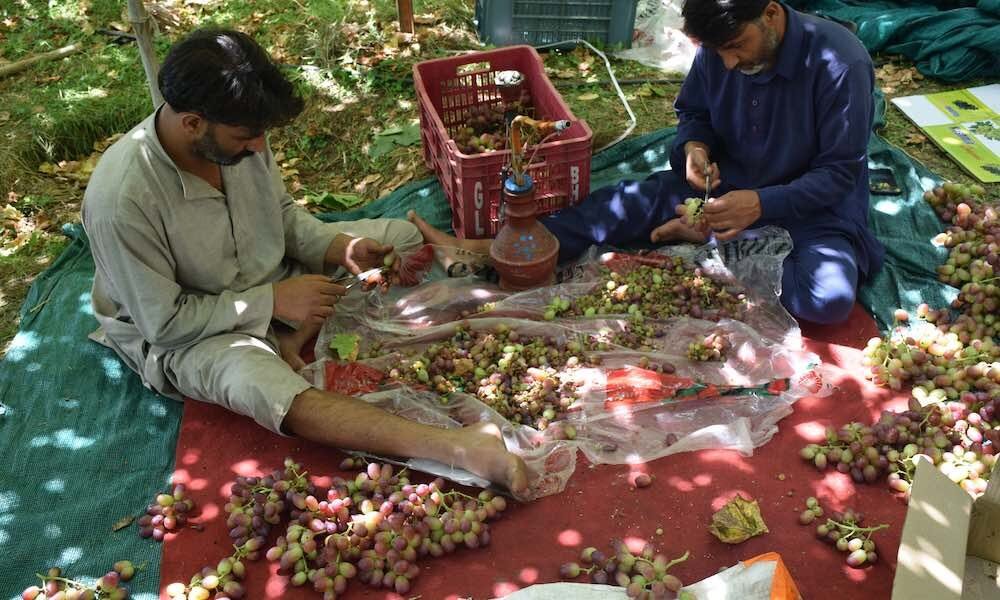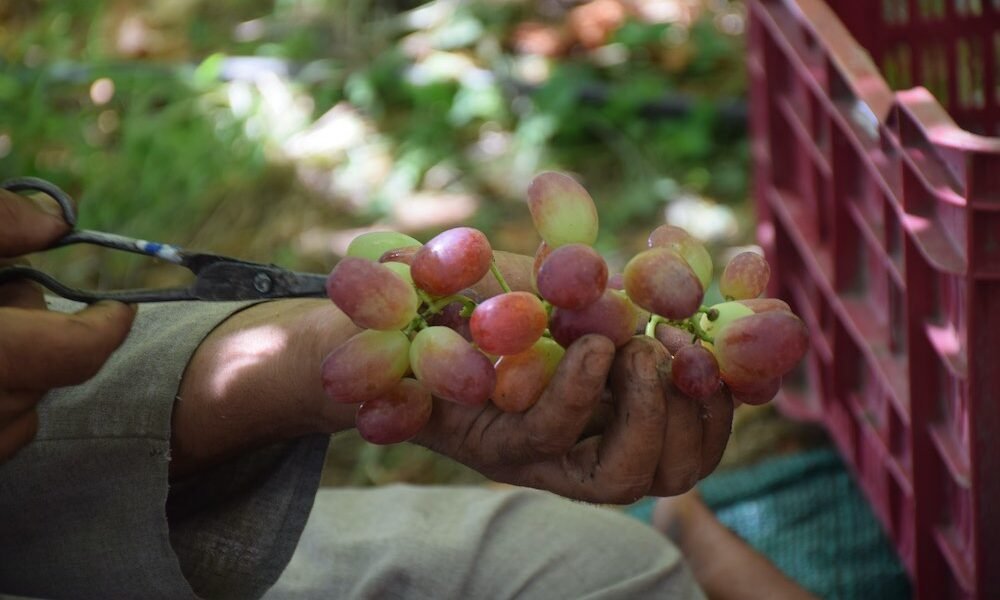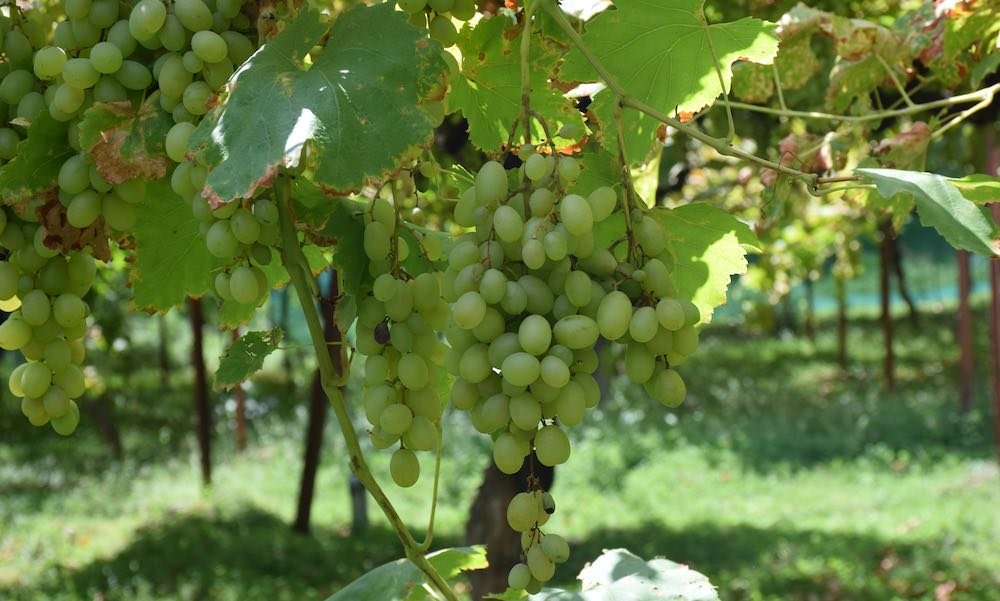AgriBiz
Age-old practice of grape cultivation in Kashmir needs revival
Published
3 years agoon
By
BK Editor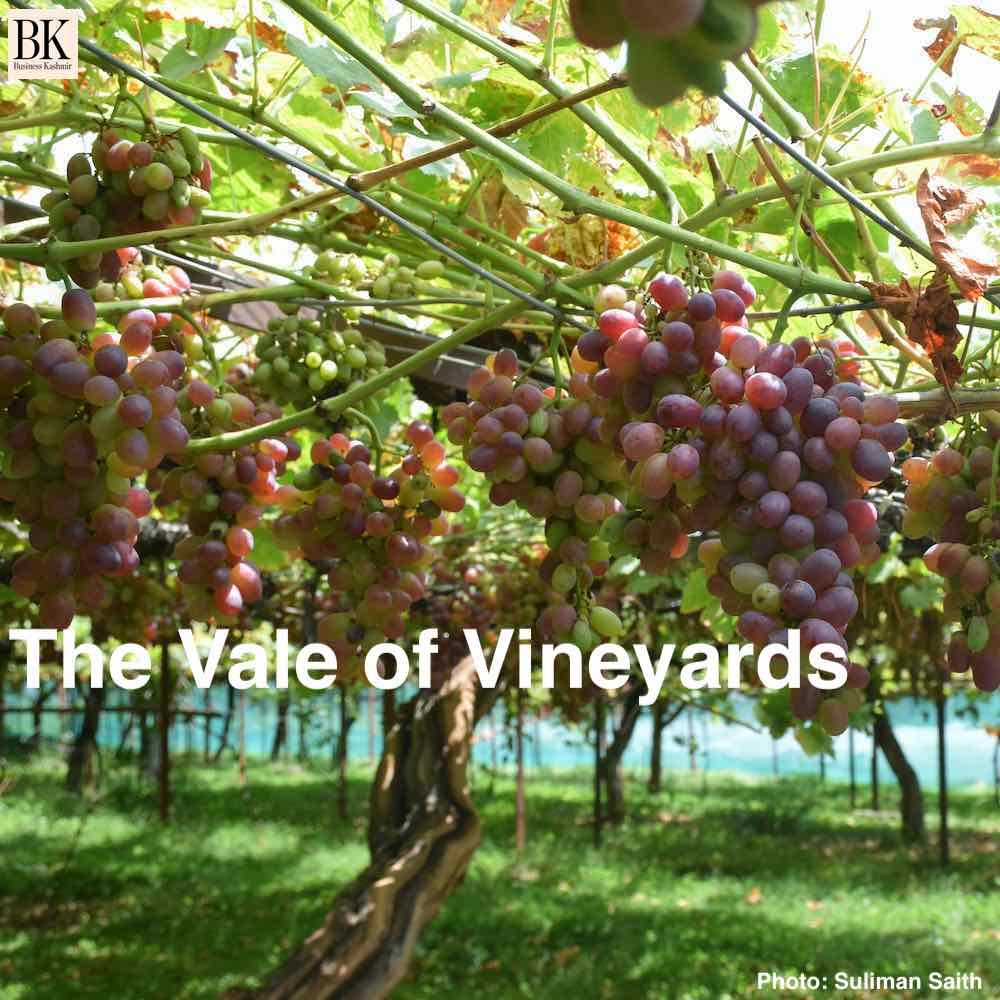
Syed Aamir Sharief Qadri
Grape cultivation in Kashmir! Harud, the harvesting season of Kashmir starts from mid-September to mid-November. During this period people are busy cutting paddy, picking fruits, unearthing underground veggies, etc. These days people harvest grapes to keep a share and give away the rest to neighbours, relatives and friends. You should know this except for a few areas of Kashmir grapes are not grown for commercial purposes.
The soil and climate have always been suitable for the progress of horticulture in Kashmir. Viticulture or winegrowing is the cultivation and harvesting of grapes. In old days Kashmir was known for its luscious grapes. Grapes – Dach in Kashmiri, is a highly nutritious fleshy fruit with numerous health benefits. It grows in bunches.
Throughout Kashmir’s history, the ruling dynasties and monarchs from time to time took interest in the cultivation of grapes. But today it has entered the dark phase of history. Neither the government nor the people take serious note to revive this age-old practice. The grape plant is found almost in the home garden of every household in Kashmir still, people don’t pay attention to cultivating it extensively.
The vale of vineyards
The majority of historians agree with the fact that Kashmir produced many varieties of fruit in abundance from the ages. The kings, nobles, merchants and religious saints together planted every kind of tree whether fruit-bearing or shady tree to promote the garden culture of Kashmir. Fruit cultivation especially grape cultivation in Kashmir has been practised since ancient times. We have a glimpse of the aristocratic asrama life of the Saiva gurus standing on a mandapa with a goblet full of wine in the middle of the vineyard (MA Wani, Islam in Kashmir). Many nobles had their fruit gardens. Raja Amar Singh and Diwan Amar Nath during the Dogra period maintained their vineyards.


Photo: Suliman Saith
Kalhana writes, Grapes”which were scarce even in heaven were common in Kashmir”. There is a reference to grape, grapevine, and vineyards in many ancient chronicles of Kashmir. While Kalhana’s Rajatarangini mentions ‘The town of Martanda (present-day Matan) was swelling with grapes during king Lalitadityas time’, Huen Tsang who visited Kashmir in the seventh century CE makes it clear that Kashmir produced abundant fruits and flowers (Samuel Beal, Si- Yu- Ki). The 11th-century Kashmiri poet Bilhana while praising the beauties of his homeland in his poetic verses mentioned growing of grapes in abundance in Kashmir.
One side of it yields saffron,
lovely by nature,
the other grapes, pale as the sweet cane
that grows alongside the Sarayu
(Bilhaṇa, Vikramāṅkadevacarita; trans. Whitney Cox)
Fruit formed a regular article of diet. Among the principal fruits that were eaten during medieval times pears, cherries, plums, apricots, grapes, apples, and peaches were found in abundance. An excerpt from the book- Kashmir Under The Sultans, “Fruits were grown in such abundance that they were rarely bought or sold. The owner of a garden and the man who had no garden were all alike, for the gardens had no walls, and no one was prevented from picking the fruits.” This claim is supported by medieval records like Tarikh-e- Rushdi and Tarikh-e-Firishta. Different kinds of drinks were made from fresh fruits among them Sharbat Angoor was quite famous. The grapes were also used in making jams (murabbha).
Grapes were cultivated all over Kashmir, and vineyards were found at every nook and corner of the valley. The vines were allowed to grow on the poplars and mulberry trees (Mutamad Khan, Iqbal Nama Jahangiri). Since the local grapes were not of superior quality, Akbar introduced new varieties like Sahibi, Kishmishi, etc. (Jahangir, Tuzuk-i- Jahangiri). Bagh-e-Dilawar Khan was a famous site for vine culture and there were more than 18 varieties raised in this orchard (Moorcraft & Trebeck, Travels in the Himalayan Provinces of Ladakh and Kashmir). Superior varieties were cultivated in Lar and Repora (Hassan Shah, Tarikh-i- Kashmir).
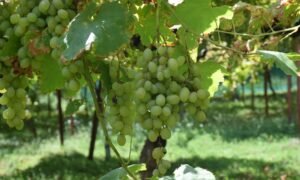

Photo: Suliman Saith
While Abul Fazl praises some fruits and considered them better than the tropical fruits of the plains of India he held an adverse opinion about grapes. He said, “though grapes were in plenty, finer qualities were rare”. This view is supported by Bernier when he says “with the introduction of better grafts from foreign countries and by paying more attention to planting and soil, the Kashmir fruit would attain the same degree of perfection as the French”.
The quality of indigenous grapes was improved side by side. In 1590 CE Muhammad Quli Ifshar, the Daroga of the gardens, first of all, grafted Kashmir fruit trees with peaches brought from Kabul. The experiment succeeded and grafting has since then been widely practised. Zafar Khan Ahsan the governor under Shah Jahan also improved the quality and taste of the cherry, plum, peach, and grapes by using better grafts and planting imported saplings from Persia and Kabul (PNK Bamzai, Culture and Political History of Kashmir, Vol 2).
During the Sikh and Dogra periods, thousands of acres were covered with vines in full bearing. Moorcraft proclaimed, “There are said to be eighteen or twenty varieties of grapes in Kashmir of which four were of foreign introduction. These are the Sahibi, of an oblong shape and red colour; the Maska, round and yellowish-white; the Hoseini, of the same colour but long; and the Kishmish, yellowish-white or green, round and seedless; this last is small but the other three are large, the Sahibi sometimes measuring four inches in its largest circumference. They are all thin-skinned, and grow in considerable bunches; those of the Maska is not infrequently of the weight of five or six pounds. The Sahibi and Maska are both fine table- grapes; wine and raisins might be made from the other two. These sorts are usually cultivated on high horizontal trellises of wood. The indigenous vines are generally planted at the foot of poplar and run up to the height of fifty or sixty feet, bearing an abundance of fruit. The grapes are commonly thick-skinned and rather rough and astringent, but juicy”. There are six varieties of grapes mentioned in ‘A Gazetteer of Kashmir’ by CE Bates which was published in 1873.
Grapes in market
The difficulty of terrain and transportation discouraged fruit growers from exporting grapes from Kashmir. Besides, the fast perishing nature of pulpy fruits that lost their taste and texture within weeks of harvest did not attract the merchant class. These delicate fruits were too fragile to be transported from one place to another. Due to the long journey, they used to spoil before reaching the market. However, with the modern modes of transport laden with CAS (Controlled Atmospheric Storage) and better connectivity this all can change now.
We don’t have enough sources to know about the export of fruits from Kashmir. But a few references are there to make us believe that grapes were exported from the beginning though not on large scale but in limited quantities. Abul Fazl in his work Ain-i-Akbari mentions that “Kashmiris bring grapes on their backs in long baskets.” Though not a primary article of trade fresh fruits and dried raisins in limited quantities were included in the export list (Jahangir, Tuzuk-i-Jahangiri). It means both grapes and dried raisins were in demand in mainland India during Mughal Period.
Niccolo Munucci an Italian traveller mentions large quantities of vegetables and fruit were exported to the Indian market. During the 17th century, the fruit merchants reached as far as south India with the fruits (Kalimatu Taibat, Ed. Inayatullah Khan). Grapes used to sell at 108 dams a maund in Mughal times (Abul Falz, Ain-e-Akbari).
Sind Valley: The heaven of delicious grapes
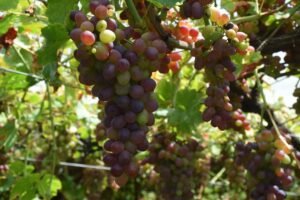

Photo: Suliman Saith
Sind valley in past as well as in the present day is known for its finest grapes. Walter R. Lawrence in his famous book The Valley Of Kashmir mentioned a few vineyards at the mouth of the Sind valley. He has also praised the white and red grapes of the state vineyard at Raipur during Dogra Period in Kashmir. Thakur Janak Singh the military commander had built a bungalow there known as Bungli Bagh which is now in ruins. This is the present-day Repora village located in Lar block in central Kashmir’s district Ganderbal- The grape town of Kashmir. For many centuries now Sind valley is known for its fresh delicious and quality grapes.
From vine to wine
Grapes were particularly valued as a fruit and were also used in brewing wine. Drinking wine seems to have been quite popular since the ancient period. The wine and grapes in Kashmir were local products. The tantric ritual required the use of liquor, hence as a prestigious item of consumption, Kashmir preserved its wine culture. Kalhana says, “both men and women were addicted to drinking”. The wine, cooled and perfumed with flowers, was appreciated as a delicious drink. It is written in Nilmatpurana that wine has been recommended, especially on ceremonial occasions.
There are many references which show that making and drinking wine was not prohibited during the Sultanate period, even though it was strongly disapproved by large section of the society. Most of the Sultans and their nobles imbibed liquor regularly (Jonaraja, Dvitiya Rajatarangini). Zainul Abidin took it in moderation, but Haider Shah was a confirmed drunkard and, as a result, neglected his state duties. Hasan Shah was in the habit of arranging drinking parties in his palace or in the boats on the Jehlum, and used to get drunk on these occasions (Srivara, Jaina Rajatarangini).
Locally the liquor was called ‘mas’ (Jahangir, Tuzuk-i- Jahangiri). Soft liquor of various types was used by all (Mohammad Sadiq Kumbu, Amal-i-Salih). It was distilled from grapes, barley, rice and mulberries (Mutamad Khan, Iqbal Nama Jahangiri). On festive occasions, there was free consumption of liquor by the participants. Anguri and Qandi were the cherished drinks of singers (Nath Pandith, Gulshan-i- Dastur). But there appears to have been a substantial decrease in liquor consumption during the later half of the 17th century (Majid Mattoo, Kashmir Under The Mughals).
Although the Islamization of Kashmir took many centuries, this tradition gradually discontinued among people but was kept alive by the ruling class. For a short period, Afghans stopped making wine but the tradition was later restarted by the Sikhs Rulers.
The consumption of alcohol is prohibited in Sikhism, but drinking culture is often associated with Punjabi culture. Moorcraft writes: “After harvesting grapes in October, they were kept in shallow earthen vessels till spring, then they were applied to the fabrication of wine, vinegar and brandy. The manufacture is ill-conducted, and the liquor is kept in bottles, which are stopped only with plugs of wood, twisted bark, or paper. No wonder therefore that the beverage is indifferent, but such as it is, it is sufficiently good to show that, with proper treatment and care, the wines of Kashmir might be made to rival many of those of Europe.”
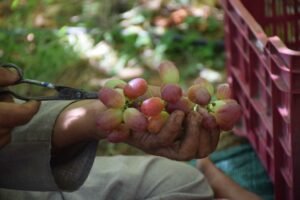

Photo: Suliman Saith
Dogra Rulers took great interest by investing large amounts to boost this industry. On the shore of Dal Lake, Dogra rulers occupied 389 acres of land for vine cultivation. The vines were introduced from the Bordeaux district (the famed wine-growing region in France) in Maharaja Ranbir Singh’s time. To make as good as Medoc and Barsac varieties of wine high-priced distillery plant was imported and set up at Gupkar on Dal Lake. Two Italians, named Signor Benvenuti and Signor Bassi, were employed to look after vineyards and wine factories (Walter R. Lawrence, The valley of Kashmir).
Why there is a need to revive grape cultivation in Kashmir
Kashmir has great potential to evolve as a booming grape cultivation hub. It is high time to reintroduce this crop for some good reasons:
First, The growth of horticulture with the revival of grape cultivation in Kashmir will immensely contribute to J&K’s economy.
Second, it will play its role to absorb a large number of unemployed youth thus reducing the unemployment rate which is at an all-time high in the state.
Third, if introduced in economically backward districts of Kashmir it will help poverty-stricken to uplift their life.
Forth, If the vale of Kashmir once again became a centre of viticulture then entrepreneurship in this field will surely flourish. The bumper crop will attract investors to apply new ideas with the latest techniques.
A poet and writer, the author has done his MA in History from the University of Kashmir and MPhil from Punjabi University, Patiala. Presently, he is a freelance columnist. You can contact him at aamirsharief45@gmail.com
You may like
-




RBI penalises Central Cooperative Banks Baramulla, Anantnag for violations
-




Editorial | J&K Budget 2025-26 – A Balancing Act
-




CII J&K Organizes Health Conclave 2024
-

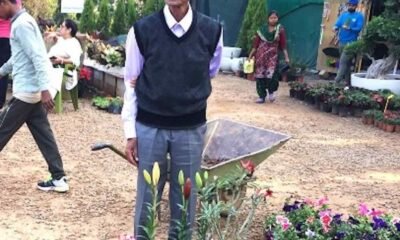


Kya kuchh tha jiske kehne ko: A tribute to father
-

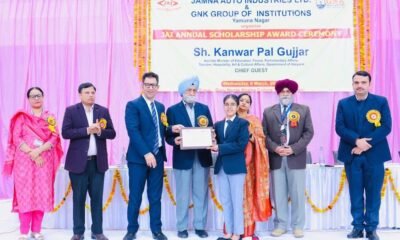


GNK hosts JAI scholarship distribution function
-




Administrative Council approves J&K Startup Policy 2024-27
AgriBiz
Building FPO Leaders: SKUAST-K, MANAGE Hyderabad complete trainers’ training
Published
4 months agoon
November 30, 2024By
BK Editor

BK News
Srinagar: The month-long Training of Trainers (ToT) program for Farmer Producer Organizations (FPOs), organised by Sher-e-Kashmir University of Agricultural Sciences and Technology of Kashmir (SKUAST-K) and Agriculture Department in collaboration with the National Institute of Agricultural Extension Management (MANAGE), Hyderabad, concluded successfully, marking a major milestone in capacity building for agricultural transformation in Jammu and Kashmir.
The program brought together some of India’s foremost agricultural business experts to train nearly 300 resource persons in eight batches. Designed under SKUAST-K’s HADP Project 20: Innovative Approaches for Promoting Agriculture in J&K, the initiative aimed to strengthen farmer organizations such as FPOs, Self-Help Groups (SHGs), Common Interest Groups (CIGs), and Primary Agricultural Credit Societies (PACS). The program covered topics like FPO formation, business planning, supply chain management, and market linkages.


Vice-Chancellor SKUAST-K, Prof Nazir Ahmad Ganai, who actively monitored the program, in his message stressed the importance of FPOs in transitioning J&K from subsistence farming to sustainable commercial agriculture. Drawing comparisons with advanced economies, he highlighted the urgent need to increase agricultural processing, which currently stands at just 2% in the region.
Prof Masood Saleem Mir, Associate Director Research and Principal Investigator of the HADP Innovative Extension Project, elaborated on the program’s objectives and logistics. “This training was designed to address the unique challenges faced by farmer organizations in J&K. By equipping participants with technical, managerial, and entrepreneurial skills, we aim to create a ripple effect where these trainers will mentor and guide farmers across the region,” he said. Prof Mir further highlighted the strategic collaboration with MANAGE Hyderabad and the Agriculture Production Department, which ensured the program’s success.
“Our aim is not just to train individuals but to build a system where farmers can access consistent support and practical solutions for their challenges. The comprehensive curriculum, covering everything from FPO formation to business sustainability, is tailored to meet the region’s specific needs,” Prof. Mir added.
The training, facilitated by MANAGE Hyderabad, featured country’s top expert in FPO formation, business planning and supply chain management. These experts provided strategic insights into FPO management, business sustainability, and innovative mobilization techniques, ensuring practical outcomes for the participants.
Participants praised the program for its practical orientation, stating that it had demystified the complexities of building successful FPOs. Many called for follow-up sessions focused on developing tailored, commodity-based business plans to enhance FPO effectiveness.
This initiative aligns with SKUAST-K’s vision to make J&K a model bioeconomy in the country, fostering a resilient and sustainable agricultural landscape. The university plans to replicate the program in the Jammu division, further extending its impact.
The event concluded with the distribution of certificates to the trainees and a pledge by all stakeholders to work collectively towards uplifting the region’s farming community.
AgriBiz
SKUAST-K innovator clinches Rs5lakh RKVY Raftaar grant
Published
1 year agoon
January 9, 2024By
BK Editor

BK News
Srinagar: An innovator from Sher-e-Kashmir University of Agricultural Sciences and Technology of Kashmir, Shaista Khan, has bagged Rs5lakh RKVY Raftaar grant for Herbodyne, an herbal toothpaste based on an indigenous Kashmir plant.
Presently pursuing PhD from the SKUAST-K’s Faculty of Forestry, Benhama campus has been awarded the grant under RKVY RAFTAAR, MANAGE, Hyderabad from Ministry of Agriculture and Farmer’s Welfare, Govt. of India. She was mentored by Prof TH Masoodi, Registrar SKUAST-K, Prof Imtiyaz Murtaza, Division of Basic Sciences and Humanities, Prof Parvez Ahmad Sofi, Prof. and Head, Div of FPU and Dr Nazir Ahmad Pala, Div of Silviculture and Agroforestry, Faculty of Forestry.
On talking to her, Shaista Khan says that it happened only due to the mentorship and support that she received from the mentors and the Faculty of Forestry, SKUAST-K. She expresses heartfelt gratitude to Prof Nazir Ahmad Ganai, VC SKUAST-K and Prof. T.H. Masoodi, Registrar SKUAST-K for providing an inspirational, motivational and unwavering support system. She also expresses her sincere thanks to her mentors Prof. T. H. Masoodi Registrar, SKUAST-K, Prof Imtiyaz Murtaza, Prof. Parvez A Sofi and Dr Nazir A Pala for their effective mentorship and for inspiring her with this innovative idea. She is also grateful to Dr Akhlaq Amin Wani, Prof.& Head, Div. of Natural Resource Management, Dr JA Mugloo, Head, KVK, Malangpora and Dr GM Bhat, Prof & Head, Silviculture and Agroforestry and other members of the faculty for their valuable support and encouragement. In addition, she says that she is very thankful to the NAHEP, SKUAST for providing financial assistance and SKIIE, SKUAST-K for their support and guidance.
AgriBiz
Vegetable Science: A Potential Area for Startups in J&K
Published
1 year agoon
December 14, 2023By
BK Editor



Dr Asima Amin Dr Baseerat Afroza Naveed Hamid
In a world grappling with the challenges of population growth, environmental sustainability, and a shifting focus towards healthier lifestyles, the potential of vegetable science in startups emerges as a beacon of transformative innovation. The intersection of agriculture, technology, and health has given rise to a myriad of opportunities for entrepreneurs to revolutionize the way we cultivate, consume, and benefit from vegetables.
As global consciousness veers towards sustainable practices and healthier food choices, startups delving into vegetable science are poised to play a pivotal role in shaping the future of our food systems. This introduction seeks to explore the diverse avenues where startups can harness the power of vegetable science to address pressing issues such as food security, nutritional health, and environmental impact.
From leveraging cutting-edge technologies in agriculture to developing novel plant-based food products, the potential applications of vegetable science are vast and impactful. This exploration encompasses not only the traditional aspects of farming and crop management but also delves into the realms of biotechnology, food technology and sustainable business practices.
We will delve into specific domains where startups can thrive, exploring how innovation in vegetable science can drive change in agribusiness, food technology, health and wellness, sustainability, and more. The goal is to unveil the untapped potential that lies within the realm of vegetable science, inspiring entrepreneurs, investors, and stakeholders to contribute to a more sustainable, nutritious, and equitable future.
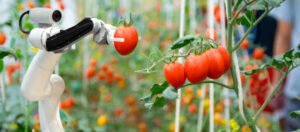

As we embark on this journey through the fertile landscape of vegetable science in startups, envision a world where the humble vegetable becomes a catalyst for transformative change, not only in our diets but in the very fabric of how we approach agriculture, technology, and the well-being of our planet.
STARTUP AREAS
Vegetable science can play a significant role in startups across various sectors, ranging from agriculture and food technology to health and sustainability. Here are some potential areas where vegetable science can contribute to startup innovations:
-
Ag-Tech Startups:
- Precision Farming: Utilize technology, sensors and data analytics to optimize vegetable cultivation, ensuring efficient resource use and higher yields.
- Vertical Farming: Develop indoor farming solutions using controlled environments, allowing year-round vegetable production in urban areas.
- Biotechnology: Explore genetic modification and breeding techniques to enhance the nutritional content, disease resistance,and overall quality of vegetables.
-
Food Technology:
- Plant-Based Alternatives: Create innovative plant-based products using vegetables to meet the growing demand for vegetarian and vegan options.
- Food Preservation: Develop technologies for extending the shelf life of vegetables, reducing food waste, and ensuring freshness during transportation.
- Nutritional Enhancement: Explore methods to fortify vegetables with additional nutrients to address specific health concerns.
-
Health and Wellness:
- Functional Foods: Develop vegetable-based products with specific health benefits, such as anti-inflammatory, antioxidant or immune-boosting properties.
- Nutraceuticals: Investigate the medicinal properties of vegetables and create supplements or health products based on their natural compounds.
-
Sustainability:
- Circular Economy: Implement sustainable practices in vegetable production, such as recycling agricultural waste, utilizing organic fertilizers, and adopting eco-friendly packaging.
- Zero-Waste Solutions: Develop technologies to utilize every part of vegetables, minimizing waste and creating by-products for various applications.
-
Smart Farming and IoT:
- Smart Sensors: Integrate sensors to monitor soil conditions, water levels, and plant health, allowing farmers to make data-driven decisions for optimized crop management.
- IoT in Supply Chain: Implement IoT technologies to track and monitor vegetables throughout the supply chain, ensuring quality, reducing losses, and enhancing traceability.
-
Education and Consulting:
- Agribusiness Consulting: Startups can provide consultancy services to farmers on adopting modern vegetable cultivation techniques, sustainable practices, and technology integration.
- Educational Platforms: Develop online platforms to educate farmers, entrepreneurs, and consumers about the latest advancements in vegetable science, sustainable agriculture, and healthy eating.
-
Community and Social Impact:
- Community Gardens: Startups can facilitate community-based vegetable gardens, promoting local produce, community engagement, and sustainable agriculture practices.
- Social Enterprises: Combine vegetable science with social impact by addressing issues like food insecurity, promoting fair trade, and supporting local farmers.
IMPACT OF STARTUPS IN VEGETABLE SCIENCE
The potential of vegetable science in startups offers a range of benefits that extend beyond economic success. These ventures can positively impact various sectors and address pressing global challenges. Here are some key benefits:
-
Sustainable Agriculture:
- Resource Efficiency: Startups can develop technologies and practices that optimize resource use, such as water, fertilizers, and land, contributing to sustainable and environmentally friendly agriculture.
- Reduced Environmental Impact: By promoting organic farming, minimizing chemical pesticide use, and adopting eco-friendly practices, vegetable science startups can contribute to reducing the environmental footprint of agriculture.
-
Innovation in Crop Management:
- Increased Yields: Precision farming technologies and genetic modifications can lead to higher crop yields, addressing the growing demand for food in a world with an expanding population.
- Disease Resistance: Genetic modifications can enhance the resistance of vegetables to pests and diseases, reducing the reliance on chemical pesticides and promoting healthier crops.
-
Health and Nutrition:
- Improved Nutritional Content: Biotechnological advancements can be harnessed to enhance the nutritional content of vegetables, providing consumers with healthier and more nutrient-rich food options.
- Functional Foods: Startups focusing on functional foods can contribute to improved public health by developing vegetable-based products with specific health benefits.
-
Economic Opportunities:
- Job Creation: The growth of vegetable science startups can lead to job creation across various sectors, including agriculture, technology, research, and product development.
- Market Expansion: Innovations in vegetable-based products can open up new markets and cater to the increasing demand for sustainable and plant-based alternatives.
-
Food Security and Accessibility:
- Year-Round Production: Vertical farming and controlled environment agriculture enable year-round vegetable production, reducing dependence on seasonal harvests and improving food security.
- Localized Farming: Community-based initiatives and startups focused on local farming contribute to localized food production, reducing the need for extensive transportation and storage.
-
Technological Advancements:
- Smart Farming: Integration of technology in agriculture, such as smart sensors and IoT devices, leads to more efficient and data-driven farming practices, improving overall productivity.
- Traceability and Transparency: Technologies for supply chain traceability enhance transparency in the food production process, building consumer trust and meeting the demand for ethically sourced products.
-
Community Engagement and Social Impact:
- Community Empowerment: Initiatives like community gardens and social enterprises create opportunities for community engagement, fostering a sense of empowerment and ownership among local populations.
- Addressing Food Insecurity: Socially focused startups can play a role in addressing food insecurity by promoting sustainable and affordable vegetable production methods.
-
Education and Awareness:
- Knowledge Dissemination: Educational platforms and consulting services contribute to disseminating knowledge about sustainable agriculture practices, technology adoption, and healthy eating habits.
- Empowering Farmers: Agribusiness consulting services empower farmers with the knowledge and tools to adopt modern practices, improving their livelihoods and the sustainability of their operations.
Conclusion
The potential of vegetable science in startups holds tremendous promise and presents exciting opportunities for innovation, sustainability, and societal impact. As the world grapples with challenges such as food security, environmental sustainability, and public health, leveraging the power of vegetable science can pave the way for transformative solutions.
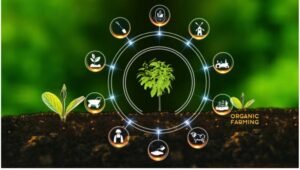

Startups focusing on vegetable science can contribute significantly to agricultural advancements by developing resilient and high-yielding vegetable varieties through breeding techniques, genetic engineering and precision agriculture. This not only addresses global food demand but also aids in the conservation of resources, reduction of environmental impact, and mitigation of climate change.
Furthermore, the integration of cutting-edge technologies, such as artificial intelligence, robotics, and data analytics, into vegetable science can enhance crop monitoring, optimize resource utilization, and streamline supply chain processes. This not only increases efficiency but also opens new avenues for automation and smart farming practices.
The nutritional value of vegetables also plays a crucial role in promoting public health and wellness. Startups can explore innovative approaches to enhance the nutritional content of vegetables, develop functional foods, or create new plant-based products to meet the growing demand for healthy and sustainable diets.
Moreover, the rise of alternative protein sources, including plant-based proteins derived from vegetables, presents a unique opportunity for startups to contribute to the burgeoning market of sustainable protein options. By developing novel processing techniques and improving the taste and texture of plant-based products, these startups can cater to the increasing consumer preference for environmentally friendly and ethical food choices.
In Nutshell, the convergence of vegetable science, technology, and entrepreneurship holds the potential to revolutionize the agriculture and food industry. Startups that embrace this intersection can not only drive economic growth but also make significant contributions to addressing some of the most pressing challenges facing our planet. As the world continues to recognize the importance of sustainable and nutritious food systems, vegetable science startups stand at the forefront of creating a more resilient, efficient, and healthier future for all.
SKUAST K under the ambit of SKUAST K Innovation, Incubation & Entrepreneurship Centre is always ready to support new young minds or budding entrepreneurs who wish to start their enterprises or have some novel or great ideas to take it forward to convert them into minimum viable products or technologies in vegetable science field can come and take advantage of this Centre situated in SKUAST K main campus Shalimar.
The authors are faculty at SKUAST-K



RBI penalises Central Cooperative Banks Baramulla, Anantnag for violations



Editorial | J&K Budget 2025-26 – A Balancing Act


Building FPO Leaders: SKUAST-K, MANAGE Hyderabad complete trainers’ training


CII J&K Organizes Health Conclave 2024


SKUAST-K to hold mega Science Summit on Aug 23-24


Haryana Biodiversity Board commemorates International Biodiversity Day at GNK Group Of Institutions


Kya kuchh tha jiske kehne ko: A tribute to father


GNK hosts JAI scholarship distribution function


Administrative Council approves J&K Startup Policy 2024-27


How to begin investing



Editorial | J&K Budget 2025-26 – A Balancing Act



RBI penalises Central Cooperative Banks Baramulla, Anantnag for violations
Trending
-

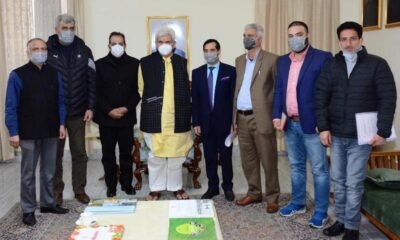

 Industry4 years ago
Industry4 years agoFCIK hails LG Sinha for creating entrepreneur-friendly industrial ecosystem
-



 Economy2 years ago
Economy2 years agoGlobal eCommerce boom and local traders of Kashmir
-

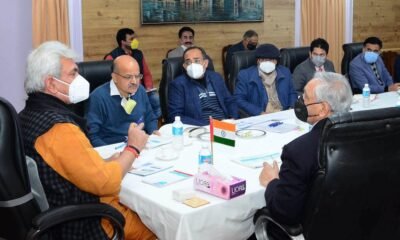

 Energy4 years ago
Energy4 years agoLt Governor discusses J&K power scenario with experts
-



 Infra4 years ago
Infra4 years agoSKUAST-K bags EU project for urban green infrastructure
-



 AgriBiz4 years ago
AgriBiz4 years agoSKUAST-K to set up 3 honey testing labs in Kashmir
-



 Jobs4 years ago
Jobs4 years agoJ&K Govt holds Industry Connect Meet-Himayat 2020
-



 Careers4 years ago
Careers4 years agoSKUAST-K holds career counselling at Wadura campus
-



 Economy4 years ago
Economy4 years agoLt Governor announces new industrial policy for J&K

